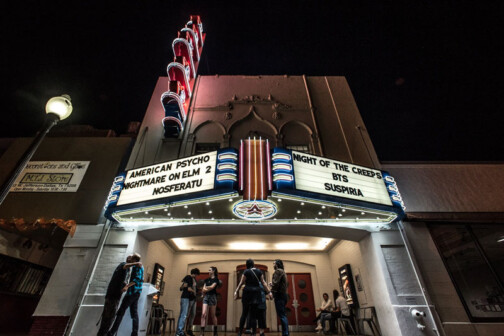It’s the cramped quarters of Theatre Three’s main stage that amplify Assassins‘ greatest asset: the feeling of unpredictability. While suspense isn’t exactly possible with a musical about America’s successful, and lesser-so, presidential assassins, it’s necessary to draw in an audience that might otherwise choose to watch a History Channel special or read conspiracy blogs instead of listen to killers sing. When someone points a gun into the audience (and this happens frequently), the intimate performance space ensures there is no barrier or measure of safe distance to hide behind.
If only this production spun its stories with the same nerve-jangling approach it takes to the presence of firearms. Stephen Sondheim and John Weidman’s time warp of a tale jumps in and out of history, uniting actual and would-be presidential assassins who usually never met, but here encourage each other to simply “move your little finger” and change history.
John Wilkes Booth (a dandy Gregory Lush, looking as though he’s thoroughly enjoying himself) is the motley group’s ringleader. The first and arguably most famous assassin, his actions set the stage for others seeking everything from a movie star’s attention to the desire to unite a country to the cure for an upset stomach. It’s Booth’s history; we just relive it.
Each infamous killer picks up his or her gun from Jason Kane’s ghoulish carnival barker (David Walsh’s Big Top-inspired set even comes with a life-sized evil clown puppet, nightmarishly lit by Amanda West). The barker insists that life’s every problem can be solved by shooting a president. While the cast, many who are new faces to Theatre Three, seizes the essence of these disturbed outcasts to turn in surprisingly nuanced and adequately sung performances, the show’s prevailing sensation is more middling curiosity than grim unease.
In the 2004 Broadway production—the show’s first, even though it was written in 1990—the narrator-type character called the Balladeer pulled double-duty by singing commentary about the assassins’ warped motives before transforming into Lee Harvey Oswald for the climatic final shooting.
Here, director Bruce Richard Coleman opts to split the characters up. Sam Swanson, who blends seamlessly into the small ensemble for most of the show, instantly inhabits Oswald’s uncertain hunch and desperate aura while pacing the sixth floor. Christopher J. Deaton’s strong voice guides us through most of the earlier murders, but his Balladeer is strangely absent from recounting some of the less glamorous attempts, like Giuseppe Zangara’s misfire at FDR and Samuel Byck’s failed plane hijacking that was meant to target Nixon in the White House.
Admittedly, musicalizing something as distancing as presidential assassins presents its obvious problems. Gazing at these cracked reflections in the mirror of American history doesn’t exactly call out for a torch song. But this is Stephen Sondheim, master of the unusual subject matter, and his stirring, wry score helps lend insight—however frail—into some of the country’s most infamously disturbed minds. That thin humanization, however, makes it that much harder for the company producing the show to whisk us along for the ride. We shouldn’t only feel connected to these characters when we’re staring down the barrel of their gun.
Photo (from left): Gregory Lush, Sam Swanson, Daron Cockerell, and Brian Lewis (Credit: Jeffrey Schmidt)





